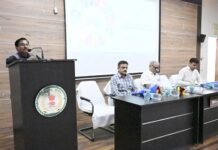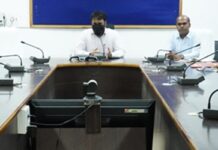On a foggy morning in late February 2017, students from several colleges of Delhi University gathered at Ramjas College to attend a seminar called “Cultures of Protest.” Little did they know that violence from sections of right-wing student parties was around the corner.
In today’s India, protest and political dissent have become bad words and anyone who so much as begins to question state actions risks being labelled an anti-national.
And so, while students inside the seminar room were listening to panelists speak on various forms of dissent, about three dozen students began chanting “Hail Mother India” (Bharat Maata Ki Jai) outside. Their voices gained strength with every call.
Akhila Bharatiya Vidyarti Parishad (ABVP), the student arm of the ruling BJP political party, led the chanting. Unable to hear the panelists, students eventually left the seminar room. About 30 were reportedly surrounded by ABVP activists and beaten with iron rods and stones. Remarkably, police officers reportedly stood by and watched.
Their story is one of several over the last year where university students in India have borne the burden of pursuing new ideas and difficult discussions – while much of the media has fallen silent on tough questions, and political opposition in parliament is, at best, weak.
Two days after the incident, an English literature student from Lady Shri Ram College, Gurmehar Kaur, posted a photo on Twitter holding a placard that read: “I am a student from Delhi University. I am not afraid of ABVP. I am not alone. Every student of India is with me. #StudentsAgainstABVP.”
This image inspired several other students to upload similar photographs. But Kaur stood out because of her lineage: Her father was a captain in the Indian army and was killed when militants attacked an army base in Jammu and Kashmir in 1999 during the Kargil War between India and Pakistan.
Not just that, Kaur had previously released a video in April 2016 holding a series of 36 placards addressing the death of her father, and calling for peace between India and Pakistan. One of the placards read: “Pakistan did not kill my dad, war killed him.”
In times when jingoism rules national narratives, the army and security forces are placed on a high alter, beyond the reaches of criticism. Specifically, in India extreme patriotism survives by portraying Pakistan as an enemy.
So, what did Twitter trolls and other jingoistic voices say when the daughter of a martyr didn’t portray Pakistan as the enemy? They issued rape and death threats.
“You will understand the flaw in your argument when a Paki brutally rapes you,” read one Tweet.
“I have managed to build a mental wall against threats,” Kaur told me, regarding such messages. She added: “But how is threatening women with rape and death nationalism?”
Kaur’s story is tightly linked to stories of protests for freedom of expression on other campuses in India.
The ABVP activists who shouted at their fellow students at Ramjas College that late February morning were opposed to two of the seminar’s invitees in particular – Umar Khalid and Shehla Rashid, scholars from Jawaharlal Nehru University (JNU).
Both Khalid and Rashid, from the violence-torn state of Kashmir, were central characters in another major incident last year.
On 9 February 2016, students at JNU protested the executions of the 2001 Indian Parliament attack convict Afzal Guru and a Kashmiri separatist, Maqbool Bhat. During these protests, some students shouted slogans in favour of Kashmiri independence from India.
Television news channels ran doctored tapes which made it look like the JNU Students’ Union President Kanhaiya Kumar was calling for Kashmiri separation from India. (It was later found that he had called for liberation from corruption in the country and not Kashmir’s liberation from India).
Paramilitary forces flooded the campus and arrested Kumar along with two other students. Umar Khalid, another student, was charged with sedition. Shehla Rashid, a Students’ Union leader, became the strong voice calling for their release. (They were released several months later).
Since then, JNU has become a symbol of anti-establishment thought. Its students are mocked on social media for not respecting the nation and its rich culture. Guest lectures from its professors at other universities have been cancelled. In October 2016, Najeeb Ahmed, a JNU biotechnology student went missing after an altercation with ABVP members, which reportedly left him injured.
Questions that the Indian state doesn’t want to hear – regarding the separatist movement in Kashmir, for instance, or the escalation of tensions with Pakistan, or even regarding inequality and castes (a Dalit student in the University of Hyderabad committed suicide in January 2016 as he couldn’t bear caste violence, for example) – are being raised by university students despite the obstacles they face.
Few other institutions can claim to be doing the same.
Political opposition is, at best, weak in India at the moment. There is currently no leader of the opposition in parliament’s lower house as no single party could muster the minimum requirement of 54 seats. The Indian National Congress only managed 44.
Civil society groups are meanwhile fearful of retribution from the government. Last year, the Indian government came down heavily on Greenpeace India, Amnesty India and some other non-profits funded by the Ford Foundation. Their activities are severely restricted as foreign funding for non-profits are managed by the government under the Foreign Contribution (Regulation) Act.
The twin pressures of shrinking funds and excessive online abuse of journalists seems to have also made the media timid. While some sections remain independent, few hard-hitting public interest stories find their way out, and the media falls short of raising tough questions.
This leaves university campuses as some of the only spaces to discuss and debate difficult issues.
Recently, the JNU student Shehla Rashid wrote: “The Modi government cannot deal with the issues we raise, cannot answer our questions regarding organised scams, communal hate mongering and economic failure…Rather than countering us politically, rather than working on developmental and economic issues, [the government] has directed all of its energy into crushing opposition.”
More than 50% of India’s 1.3 billion people are under the age of 25 and questions of economic development, employment and human rights are critical for them – and the country’s future. It seems fitting that university students are fighting for space to debate complex issues.
Female students have long taken the lead in protesting for social justice. They raised their voices against misogyny and sexism at universities throughout last year, for instance.
“I think we can change the course of history. We have it in us to do so. We want a peaceful world for ourselves,” Shyamali Dutta, a Delhi University student, told me. Kaur echoed her sentiment. “I am,” she said, “a humanist at heart.”















